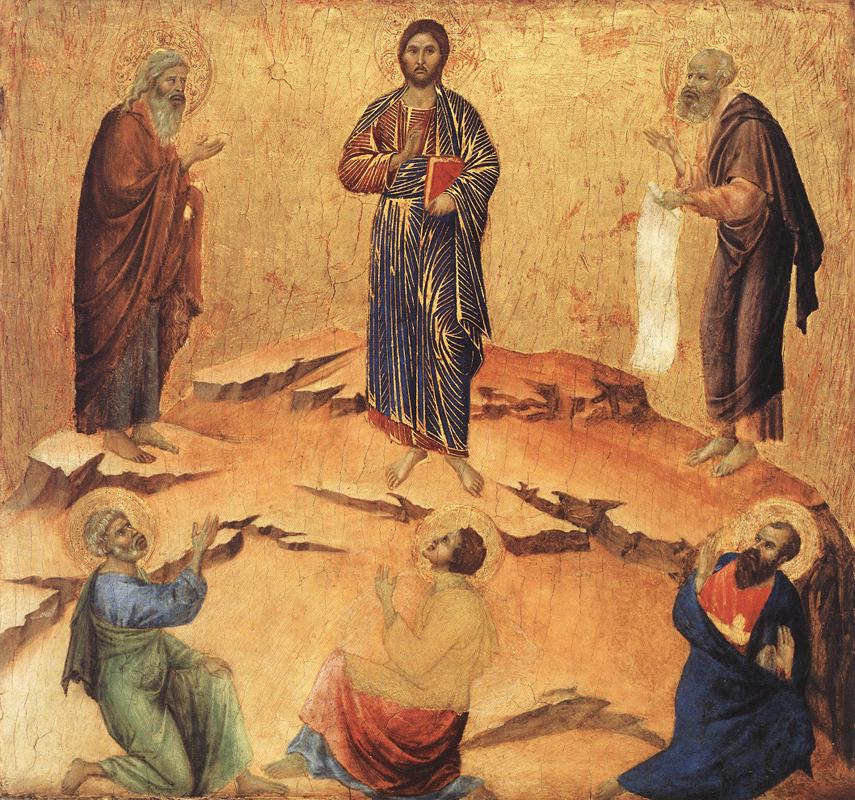
This Sunday is “Transfiguration Sunday” in the West, and so in Year B the Revised Common Lectionary gives us Mark 9:2-9. The same text will be one of the options just two weeks from now, on the 2nd Sunday of Lent.
The Transfiguration
Unlike last week’s Gospel, this text is one story, focusing on a single remarkable event: Jesus took his three closest disciples up a mountain and they saw him shine with divine glory. The three Synoptic Gospels include the story in very similar terms. John omits it.
As is often the case, in my meditation on this text I am drawn to a number of little details, the twists and turns of Mark’s telling of the tale. I find each of them is ripe for fruitful contemplation — any time a little detail of a passage jars me out of my ordinary train of thought this seems to be the case. And any of them could be the focus of a sermon on this passage.
1. Apart, By Themselves
I love how emphatic Mark is about the four guys taking some time away from the the rest.
led them up a high mountain
apart,
by themselves.Mark 9:2 NRSV
Maybe it’s a useful thing to note. The small group of them left the rest behind. On purpose.
Sometimes in churches, especially in small churches, we act as if we can only do things if everybody can come. We labor to make sure that two activities are not planned at the same time. We know the particular people on the finance committee will not want to go to Spring Garden Clean Up Day, but just in case we put the events on different days.
It’s something that can hold a church back from, say, small groups like Bible studies and prayer groups. We think having a particular small group, something others aren’t invited to, is a problem — it’s “exclusive.” And we don’t want that.
But here is Jesus, choosing these three friends to join him in this unique experience. The others just aren’t invited.
Maybe the others were down at the foot of the mountain grumbling about being left out.
Personally, I doubt it.
Jesus, as a leader, chose particular people to share particular experiences.
Leaders need to do the same thing today. There is wisdom in creating all kinds of focused small groups, and churches can build health by having whole networks of small groups. That’s how close relationships grow, and where real learning happens.
2. He Was Transfigured
Mark uses an important turn of phrase in describing the central event of the Transfiguration.
And he was transfigured before them
Mark 9:2 NRSV
Notice that? He declares that the transfiguration actually happened. He was transfigured.
And he makes it something that happened to Jesus. He was transfigured.
It’s kind of too easy for people in our era to describe what happens as “a vision” — something that happens to the eyes, or in the perception, or the memory, of the disciples. I’m pretty sure I’ve described it this way myself.
But if we describe the transfiguration as something that changed the way the disciples saw, then we minimize it.
The text, on the other hand, tells us that Jesus was really changed.
Yes, the disciples saw “behind the curtain,” and got a glimpse of Jesus’ divine glory. But Mark wants us know that the curtain itself was actually drawn back.
They didn’t have a flash of insight or a visionary experience.
Jesus showed them something, revealed something about himself that he generally kept hidden.
- If I have a vision, then you could be standing right beside me but see nothing.
- But if Jesus really was transfigured, then if you had been there you would have seen it too.
I’m not going to assert any big implications of this. I just think we need to contemplate it and preach it as something real — albeit something very mysterious.
Ponder what you would see if Jesus pulled the curtain back today.
3. Jesus, Elijah, and Moses
One thing the three disciples saw was blinding light. Jesus himself was transfigured, and even his clothes shone.
The other thing they saw was that Jesus was chatting with friends — ones they hadn’t seen there a moment before.
And there appeared to them
Elijah
with Moses,
who were talking with Jesus.Mark 9:4
I notice the language leans a tad more toward the visionary here. That is, there’s a potential contrast between “he was transfigured” and “there appeared to them.” But the contrast is not strong, and may not be intended at all. Either they “appeared to them” in a vision, or they “appeared to them” because they were actually there.
I lean toward the “actually there” theory. Visions are usually just for one person.
I used to feel rather befuddled by Jesus’ choice of company at the transfiguration. Why Moses and Elijah?
Moses is the lawgiver, and it sure seems like in Jesus’ time Elijah was the prototypical prophet.
(I would have picked Isaiah as the prototypical prophet, reading the OT through the lens of the NT theology, but in the Gospels they had a real expectation around Elijah returning. Elijah was the key player.)
When Luke tells the story he gives a clue to another reason. Luke says the three of them were talking about Jesus’ upcoming “exodus.”
- The original Exodus, of course, was Moses parting the Red Sea so the Israelites could escape slavery in Egypt.
- Less prominent in Christian memory is the fact that Elijah also parted waters, making it possible to pass through a river dry shod.
So as well as “Law, Prophets, and Gospel,” these three are all “exodus” figures in one way or another, sharing a symbolic image and language for how salvation comes about for God’s people.
Mark leaves it a mystery. Just three great leaders holding the original summit meeting.
4. Peter’s Big Idea
Though it is not especially inspiring, I’ve always loved Peter’s role here.
Then Peter said to Jesus,
‘Rabbi, it is good for us to be here;
let us make three dwellings,
one for you,
one for Moses,
and one for Elijah.’
He did not know what to say,
for they were terrified.Mark 9:5-6
Scared? Confused? Peter’s solution: Say something — anything.
Propose a construction project on top of a mountain.
It seems kind of dumb, but there may be some wisdom there.
No, the wisdom is not in the actual suggestion, the idea of building mountain chateaux for the three great leaders.
Rather the wisdom is in Peter’s strategy for dealing with a baffling situation: Say something — anything — with no fear of sounding stupid.
By saying something, he got a response. Clarity came directly from God.
Would God have spoken if Peter hadn’t been the catalyst to conversation?
So say something when you’re confused, whether to God in prayer or to others who share your plight. Don’t just sit there and cower. Talk about it.
You might just hear an answer.
5. Listen
Then there is the marvelous message from the cloud of God’s presence:
This is my Son,
the Beloved;
listen to him!Mark 9:7
It’s a tad different from what Jesus had said to these guys back in chapter 1.
- Back then, Jesus asked them to follow.
- Here, God asked them to listen.
Both are good. But for people who have been trying to follow Jesus for a few pages of their lives, the call to listen seems pretty wise.
We get convinced, after a while, that we’ve heard it all. We tell ourselves we know exactly where Jesus is taking us.
But I’ve noticed that people claiming to be following Jesus are doing stuff he actually said not to do. (Actually I’ve noticed it a lot recently)
Maybe if all of Jesus’ followers made it a point to be Jesus’ listeners, our following would look a bit more … Christ-like.
6. Tell No One
Then at the end, there’s the mystery.
They’ve just seen the most amazing thing ever, and heard a direct message from heaven, and what does Jesus say?
he ordered them to tell no one about what they had seen,
until after the Son of Man had risen from the dead.Mark 2:9 NRSV
Well that’s kind of rotten.
It would seem a lot nicer if Jesus let them brag, I mean humbly tell, about it when they met up with the rest of the gang.
If the reading went on one verse more we would know that the request left them confused about what “rising from the dead” meant. Maybe the whole experience was to get them thinking about that question — after all, he had told them in chapter 8 that he would die and rise from the dead, but it clearly didn’t stick.
Jesus had his own sense of when his own big secrets should be revealed. This image of the transfiguration was to be kept secret for now.
But I suspect that it was also good for the disciples to have to keep quiet about something so profoundly moving. When you and I have profound experiences of God’s presence, we are also well advised to be circumspect in whom we tell and when we tell it. It builds humility. And it holds dear what is truly precious.
++++++++++++
This year Mark is the main Gospel in the Revised Common Lectionary. Want a great way to creatively engage with each Sunday’s text? Want something to keep your kids on-topic during the sermon on Sunday? Try my Illuminate-You-Own Gospel of Mark. Each story is on a page of its own, with a blank facing page for doodles, prayers, sermon notes, or journal entries. Click the image below to check it out on Amazon. (It’s an affiliate link.)



Hi, Gary.
Hope you’re feeling better.
Thanks for another insightful and helpful commentary.
Some thoughts:
1. I will be presiding at the ordination of two new ruling elders this Sunday and find the ”setting apart” aspect especially relevant.
2. Perhaps the Gospel-times expectation of Elijah’s return had to do with the way he left the earth — ascension rather than death — and with the prophesy at Malachi 4:5.
3. As to your suggestion that we keep quiet about our profound personal encounters with God, I am reminded of the angel’s instructions to the woman at the empty tomb: Go, tell! (Although , in Mark, they don’t!)
Salaam,
April
Dear April:
Thanks so much!
Good points all around. I hope the ordination is a wonderful event for the new elders and for the whole congregation.
Quite right about Malachi. I was thinking of how Isaiah is such a dominant voice in the NT understanding of the Messiah, and how this contrasts with their actual expectation of a particular prophet’s return.
As to keeping quiet in contrast to telling all, I think it’s a matter of discernment. Actually the women at the tomb, had they known of the Transfiguration, would have been right to tell of that too — Jesus didn’t tell the three that they could never tell; only that they must wait until he had risen from the dead.
We should not always keep quiet about encounters with God. We do well not to use them to impress others. But we need to talk about them to make sense of them rather than forgetting them by inattention. If interested in a challenging read that deals with this, see James Loder’s “The Transforming Moment.”
Blessings,
Gary